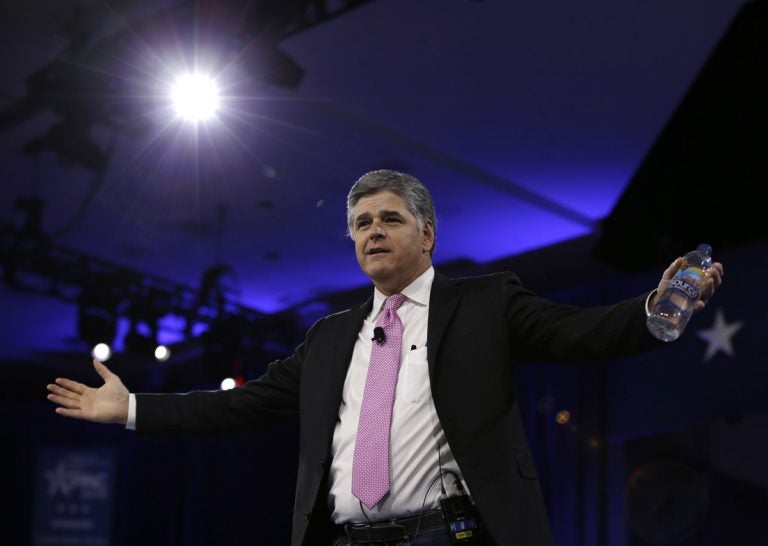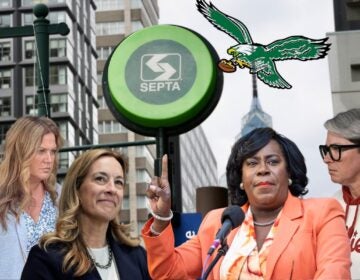Sean Hannity’s cozy conflict-of-interest hackery

In this March 4, 2016, file photo, Sean Hannity of Fox News arrives in National Harbor, Md. (Carolyn Kaster/AP Photo, file)
It’s exquisitely delicious that Michael Cohen’s mysterious third client turns out to be Sean Hannity. But the news barely budges the shockmeter.
What we have here is America’s tawdriest troika: A hack “president” who mouths propaganda, a hack lawyer who mops his messes, and a hack infauxtainment host who champions the hack lawyer and amplifies the propaganda. On this three-cornered clown show, it makes perfect sense that the hack host would fail to inform his credulous Fox News fans that he’s basically in bed with the hack lawyer.
After the FBI raided Cohen last week — in a series of searches approved by high-ranking Trump appointees — Hannity ranted on the air for three straight days about “an unprecedented abuse of power,” about “a violation of (Cohen’s) constitutional rights” that “needs to be countered and countered immediately!”
At minimum, a real news network would’ve required him to reveal his ties to Cohen, to inform the public that he had sought legal advice from someone on Trump’s payroll, but, as we know, he’s fortunate to work for a network that tolerates his fake news.
But will Hannity’s fans care that he has a blatant conflict of interest? Nah. They already know that he lives to slavishly serve the Leader, so it’s logical (as it were) that he’d be tight with someone who’s similarly servile. It’s a closed loop. They love Hannity because he’s a dependable brand, like a Big Mac. They tune in to taste his special sauce — his crackpot paranoia, his disdain for Trump’s enemies — and it’s yummy every time.
Lots of conservatives have long been hip to Hannity’s hackery. Caleb Howe, a commentator on the right-wing RedState website, said in 2016 that “if Donald Trump decided to campaign on nuking all of middle America, Hannity would be on his radio show that afternoon talking about how great all that new elbow room would be.” And Charlie Sykes, a former conservative talk show host who has retained his sanity, has lamented that “I feel dumber every time I listen to Sean Hannity.” But Hannity’s fans shrug off the naysayers; they feast on his insular stupidity.
Granted, they would be outraged — and Hannity’s head would explode — if someone like Rachel Maddow championed a Hillary Clinton lawyer while soliciting that same lawyer. But even though Hannity considers himself a member of the Fourth Estate (he said last year, “I’m a journalist”), he and his fans exempt him from the ethical rules that bind real journalists.
The rest of us are left to marvel at this latest turbulence in the Trump sewer. Hannity’s name surfaced because Cohen asked a federal judge to bar investigators from reading the seized materials, claiming that the raid violated attorney-client privilege. (If the feds have serious reason to believe that crimes have been committed, privilege is waived. Cohen is under criminal investigation for bank fraud and campaign finance violations.) In response, the judge said that in order to properly assess seized materials, she needed to know the names of Cohen’s clients.
In 2017, Cohen had only three clients: Trump, a major Republican donor who’d fathered a child with a former Playboy playmate (you cannot make this stuff up), and a mystery third person. Yesterday, Cohen lawyer Todd Harrison balked at naming the mystery client — whom he described as “a prominent person” who wished to remain anonymous. But he finally relented, naming Hannity — to a chorus of courtroom gasps. As one reporter on the scene later said, “All the air got sucked out of the room.”
Only then did Hannity fess up — sort of. His various remarks — in a written statement and later on the air — were hilarious. He said that “Michael Cohen has never represented me in any matter … I never retained him in the traditional sense,” because he only wanted Cohen’s “input and perspective.” He said Cohen advised him for free, but at another point he said, “I might have handed him 10 bucks.” He also said, “We definitely had attorney-client privilege because I asked him for that.”
But if Cohen never represented him in any traditional sense, if he only sought “input and perspective,” why is he claiming attorney-client privilege? More importantly, if his dealings with Cohen were truly minimal, why did he wish to conceal those dealings? I can answer that one. He didn’t want to come clean even with his indulgent audience. When he assailed the FBI raids as “a runaway train,” he didn’t want anyone to know he was compromised. He didn’t want to append an asterisk to his propaganda.
Decide for yourself whether that sounds fair and balanced.
WHYY is your source for fact-based, in-depth journalism and information. As a nonprofit organization, we rely on financial support from readers like you. Please give today.




